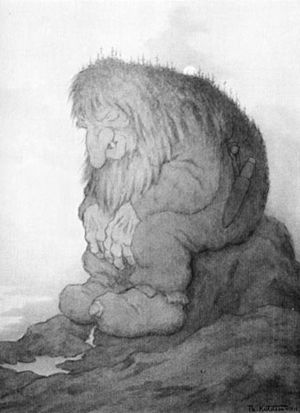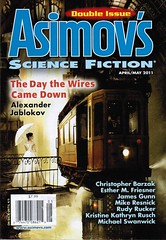Well, I thought I would have more rather than less to say about the novelettes. But, as it turns out, I have less to say. Therefore, I have decided to combine my experience and interpretation of the two novelettes into a single post.
The Outside Event
The introduction to the author, Kit Reed, gave me a double take. Initially, I read 'transgendered' when 'transgenred' was written. In any case, she has her own webpage if you want to learn more about her and/or find more works written by her. It's not a great website, but it's certainly better than nothing.
The Outside Event is written from the perspective of a young teenage protagonist. She has gone off to what is a haunted house as a participant in a sort of reality show for writers. The competitors are a mix of young adults. However, it does seem that it's their social relationships that dictate the winner rather than their writing or the quality of their writing. While there are several mentions of how one writer or another manages to write six lines or a page or a few thousand words, this does not really seem to make much of a difference. It is not always clear what the real reason why a single member is eliminated or a swathe of members. There is no voting, there are no competitions or trials for them other than to follow the basic rules set in the beginning of the story.
I think it would be a very interesting topic: scifi reality show. However, I don't know if this novelette is particularly interesting or accurate to the genre. I think she could have done a much better job in this way.
I did not find the story all that interesting, but it did give birth to several ideas of my own. That in itself can be more important than just about anything you can find in a short story.
My Husband Steinn
Eleanor Arnason has a rather healthy list of published credits posted on her Wikipedia article.
 Image via WikipediaThis is a story set in Iceland. Superficially, it's a story about a girl who lives in a hermitage. Far away from civilization, a girl, Signy, ends up winning the admiration of a married troll. That troll she kills or freezes by exposing him to full spectrum lights which resemble the sun's actual rays. He turns to stone as a result. Of course, one could reverse the myth and say that as soon as light appears, it turns out that it's not a troll and it's just a rock that kind of looked like a giant man.
Image via WikipediaThis is a story set in Iceland. Superficially, it's a story about a girl who lives in a hermitage. Far away from civilization, a girl, Signy, ends up winning the admiration of a married troll. That troll she kills or freezes by exposing him to full spectrum lights which resemble the sun's actual rays. He turns to stone as a result. Of course, one could reverse the myth and say that as soon as light appears, it turns out that it's not a troll and it's just a rock that kind of looked like a giant man.In any case, the troll's wife comes along and finds him frozen in stone. She inquires about the reason, and finds out that her husband had been trying to cheat on her. Rather than get angry at Signy, she forgives her and blames her troll of a husband. Feeling bad for her, Signy takes it upon herself to feed her children.
There is a large hydro dam being built near Signy. As a result, nature and the magical creatures which hide in her embrace, are under a serious threat. Despite the elves best attempts at stopping the construction, it goes on, and they all decide to leave. Signy gets to be a witness of it all, and is asked to keep a historical account describing what happened.
A little further past the surface of this story, there is something a little more interesting. Again, this seems to play with the trope of conflict between religion, substituted with myth, conflicting with science (the building of the dam). It is about how the further science and engineering encroach upon nature, the further back myth and nature get pushed.











